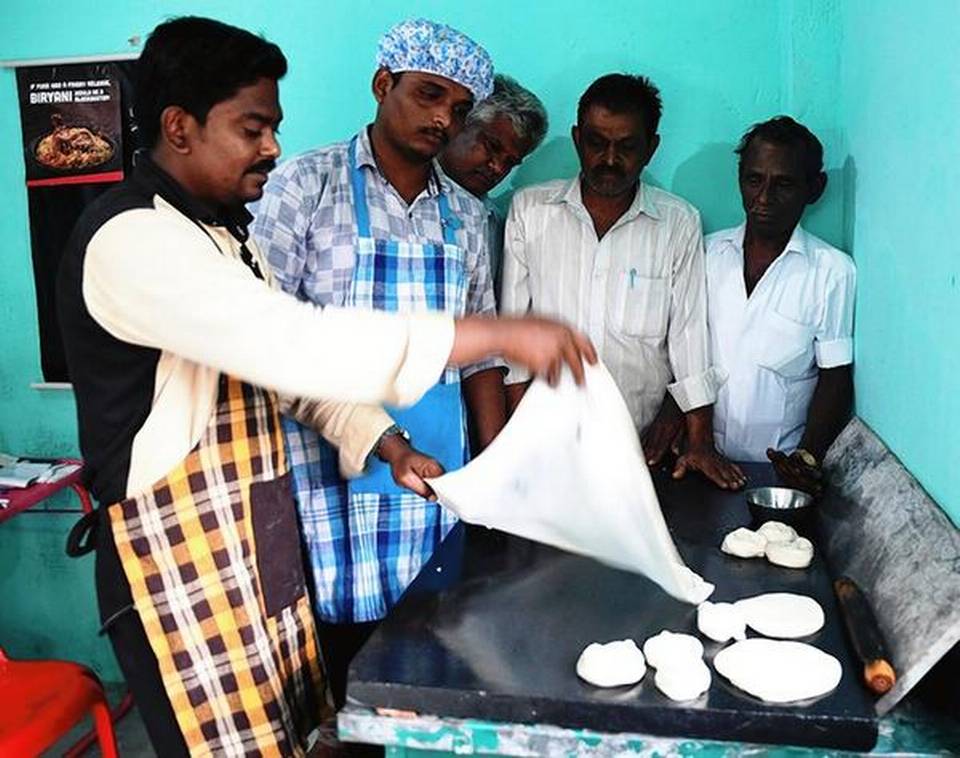Madurai, TAMIL NADU :

Mohammed Khasim conducts a 30-day course and his batch already has 50 students
At 10 a.m. on Thursday, A. Mohammed Khasim’s student is sitting in the first chair, noting down ingredients for parotta in his notebook. Maida, salt, eggs, he writes and looks up. “cheeniyuma master?” (Sugar too, master?).
There is only one student in the morning batch of this parotta school for November, but Mr. Khasim says that A. Rajasekaran, the soon-to-be parotta master, works a day job. The veteran tries to find a way to accommodate his pupil early morning. In the evening though, his parotta school is filled with up to 50 students — some big and burly, others short and young, but all ready to perfect the art of this puffy flat bread. “My students either come with years of experience, waiting to perfect their skill but most others are fresh out of catering colleges, hoping to find good jobs outside the country,” he says.
Mr. Khasim, who began a school for people wanting to learn the art of making the perfect parottas three years ago in Koodal Nagar, says that the dish must be crispy and flaky on the outside but soft and easy to tear. The flat bread should be able to soak Madurai’s preferred gravy- chicken salna- into its layers while holding it all together steadily.
He says that the city’s undying love for the dish has led to a boom as it is now widely popular. It has also created a market in various other districts of Tamil Nadu and locations outside the country including Dubai, Sharjah, Malaysia, Singapore and the Maldives.
“This is why so many young people are waiting to learn how to make parottas. There is a large manpower shortage in the hotel industry as many people are unaware of the perfect way of rolling, shaping and making a parotta. Hoteliers in resorts outside India want to recruit south Indian masters because of our unique way of rolling out the dough without the help of a rolling pin. That is when I decided to open the school three years ago and impart my knowledge,” he says.
How it began
Mr. Khasim is a third-generation hotelier whose family has made parottas for about 70 years now. “My grandfather opened a small shop in Sikkandar Chavadi years ago and I have grown up to take care of the business. In those times, parotta would only be eaten with sambar. People began wanting spicier side dishes. That is why chicken curry and salna began making their way as potential side dishes,” he says.
Although Mr. Khasim says that he was always excellent at making parottas, making the perfect chicken curry was always a problem for him.
“When I tried to ask several masters to teach me, I realised that none of them were willing to. For six months, I worked undercover as a cook in a small hotel in Madurai to learn how to make the curry. During the first four months, the chef would make me do menial tasks when he would make his famous curry as he was paranoid about me taking over. The insecurity of losing one’s job is very prevalent in this field. That is when I decided that nobody else should suffer my fate,” Mr. Khasim says.
Mr. Khasim said that skilled parotta makers receive hefty advances amounting to about ₹50,000 and receive anywhere between ₹800-₹1,600 each day as salary.
He says that several students come to learn to start businesses since there was interest in entrepreneurship here. He says he has helped people set up small shops by taking them through the process of applying for MUDRA loans. “Some people come because they like cooking. I have taught pastors and professors too. Classes are truly interesting,” he says.
Mr. Khasim says he is in talks with Government Polytechnic College in Madurai to begin a certificate course in parotta making. “Though our students are recruited outside, people demand training certificates. The tie-up will help students secure good jobs,” he says and adds that he will be invited to teach on the campus soon.
He is also training women, particularly those who are part of self-help groups, to make good parottas and chapatis. “There is dearth of women in this job. So many of them are already great cooks. This skill will help them find better employment and make a variety of dishes,” he says.
His regular course lasts 30 days and costs ₹5,000 a month.
source: http://www.thehindu.com / The Hindu / Home> Cities> Madurai / by Sanjana Ganesh / Madurai – Novemer 30th, 2019








